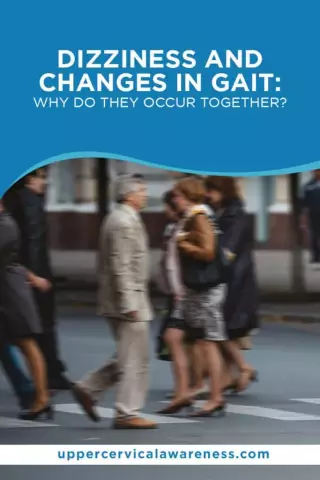- Author Rachel Wainwright [email protected].
- Public 2023-12-15 07:39.
- Last modified 2025-11-02 20:14.
Dizziness

Dizziness is an unpleasant sensation of movement of objects around, or oneself. According to statistics, dizziness is one of the most frequent complaints of patients to the doctor. A wide variety of diseases can cause dizziness.
A healthy person feels a state of balance due to signals from the proprioceptive, visual and vestibular systems entering the cerebral cortex. The brain, in turn, transmits impulses to the eye and skeletal muscles, which ensures the necessary position of the eyeballs and a stable posture. If the flow of impulses from the vestibular sections to the cortex of the parietal and temporal lobes is disturbed, the illusion of movement of surrounding objects or one's own body arises.
Types of dizziness
- Vertigo with cerebral disturbances. It occurs due to pathologies of the cerebellum. The causes of dizziness here can be a tumor, cranial trauma, displacement of the cerebellum or hydrocephalus, vascular disorders of the brain, injuries of the cervical spine. Sharp and severe dizziness can be a symptom of cerebellar infarction. It may also be due to the use of chemicals or drugs, which include barbiturates and anticonvulsants, which can cause dizziness, drowsiness, and lethargy.
- Psychogenic dizziness. As a rule, it manifests itself due to severe fatigue or after strong emotional distress. In this case, the patient may feel a feeling of instability, weakness, confusion in the head. Pathological conditions that cause dizziness can be mental disorders such as anxiety with panic attacks, depersonalization, hysteria.
- Dizziness with pathology of the ear. It occurs as a result of damage to various structures: vessels and nerves of the Eustachian tube, the vestibular apparatus. It is usually combined with tinnitus and pain, hearing loss. The simplest cause of vertigo is a sulfur plug in the ear canal.
- Vertigo of the ocular nature. It occurs predominantly in healthy people as a result of too much visual stimulation. Also, the cause of such dizziness can be paralysis of the eye muscles, which leads to a violation of the projection of objects onto the retina of the eye, due to which a "wrong" picture appears in the brain.
How to determine the cause of dizziness?
There are about 80 known causes of vertigo. So, dizziness resulting from a violation of the vestibular apparatus or damage to the inner ear is called peripheral. If dizziness occurs as a result of diseases of the brain, then it is called central.
The nature of dizziness, the symptoms that occur during this, the frequency and duration of attacks help determine the true cause of dizziness:
- Hearing loss, discharge from the ear, usually indicates inflammation of the inner ear. Mainly, the treatment of vertigo is conservative.
- If dizziness is accompanied by vomiting and nausea, hearing loss, tinnitus, then Meniere's syndrome may be present. If the auditory disorder does not occur, then vestibular neuritis may be present. With neuritis, there is sudden and severe dizziness, when trying to stand up or moving the head, the feeling of rotation increases.
- With severe tinnitus, sudden one-sided deafness and vomiting, we can talk about a perilymphatic fistula with about 50% certainty. Also, a fistula can be manifested by hearing impairment, severe or slight dizziness.
- If you experience dizziness or unilateral hearing loss, you should be tested for tumors in your brain. Often, with tumors, first a slight dizziness occurs, and then a strong one, and is often accompanied by gradually increasing headaches. In certain positions of the body, increased dizziness is characteristic.
- With a stroke and transient disturbance of cerebral circulation, dizziness is accompanied by weakness in the limbs, double vision, impaired coordination of movements, and sensitivity disorder.
- If, along with dizziness, there is a feeling of disorientation in space, instability, it increases with sudden movements, there is a feeling of pain and limited mobility in the cervical spine, then it is worth checking for diseases in the cervical spine.
- If the vertigo is preceded by a spinal or head injury, the most likely cause is a head injury or whiplash.
- If you experience slight dizziness while traveling in transport, in a car or train, traveling by water, the most likely cause is transport motion sickness.
- If dizziness is associated with an abrupt change in the body in space, then this is benign positional dizziness. This disease can be detected using a simple positional test.
- With basilar migraine, severe dizziness may occur before the headache, which can be both short-term and long-term (up to several hours). It is usually accompanied by nausea and vomiting, tinnitus and other neurological signs.
Vertigo diagnosis

The main thing in diagnosing dizziness is to identify the cause. Given the great variety of probable reasons, this presents certain difficulties.
The doctor tries to find out from the patient all the symptoms that accompany dizziness, determines its nature (paroxysmal or persistent), whether the change in body position affects the dizziness, whether it was preceded by an injury to the spine or head. Finds out if the patient is taking any medications, etc.
In order to clarify the reason, the doctor prescribes the following studies:
- ECG;
- general blood analysis;
- X-ray of the cervical spine;
- general therapeutic examination;
- MRI of the brain.
Vertigo treatment
Mostly the treatment of systemic vertigo is symptomatic. Etiological treatment is carried out only for a narrow range of diseases (basilar migraine, bacterial labyrinthitis, temporal lobe epilepsy, stem stroke, cholesteatoma, etc.).
To prevent dizziness, vestibulolytic drugs are used that affect the vestibular receptors and central vestibular structures. Antihistamines and tranquilizers are also used. Metoclopramide helps relieve vomiting and nausea. With prolonged dizziness, dehydration is performed and diazepam is injected intravenously.
Recently, treatment of dizziness has been carried out with betahistine hydrochloride. A particularly positive effect from its use was noted in Meniere's disease.
YouTube video related to the article:
The information is generalized and provided for informational purposes only. At the first sign of illness, see your doctor. Self-medication is hazardous to health!






